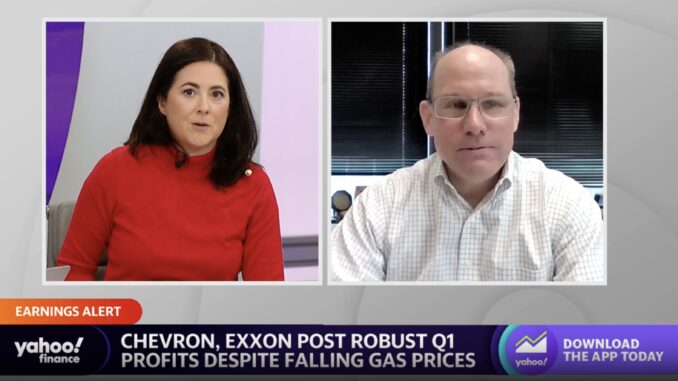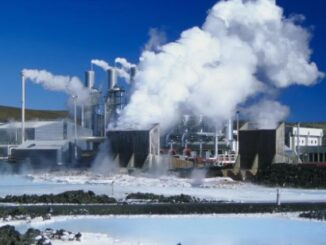
Wells Fargo Analyst Roger Read joins Yahoo Finance Live to discuss quarterly earnings for Chevron and ExxonMobil, falling gas prices, the expectations for a hard landing, and the outlook for oil.
– Despite concerns from investors that a sluggish economy would lead to a decrease in energy demand and, subsequently, reduced profits for oil companies, that’s not what’s happening. ExxonMobil and Chevron both demonstrating resilience in the first quarter by posting healthy profits despite the drop in gas prices. Wells Fargo analyst Roger Read is joining us now to discuss. Both of them seeing some interesting production trends, particularly what we’re hearing from Exxon. Exxon also has a lot of cash on hand. Roger first of all, just give us your big-picture takeaways from these two and if there’s something, a theme that you’re reading as we’re starting to get big oil.
ROGER READ: Yeah. Thanks, Julie, for having me on here. Yeah, I think if you look at the quarterly results, I mean, what you see is these companies have reduced their costs a tremendous amount. And so yes, prices are good. But business has actually been improved, right, from how they capture at the wellhead, the costs they’ve taken out of the business, and as Exxon, of course, mentioned today, at a larger scale what they’re trying to do on the trading side, trading throughout the business, along the value chains and across their value chains.
– Roger, Ines here. And ExxonMobil, a lot has been talked about the cash that ExxonMobil is sitting on and whether or not it would acquire Pioneer. There’s been a report, a recent report about eyeing an acquisition. Do you see something like that happening? And if not Pioneer, which?
ROGER READ: Always a tough question to answer for the company or for us. So I think if you look at what’s typically made M&A work in this space, it’s more often occurred during a time of stress, meaning low commodity prices or some other exogenous event that creates reasons for mergers. It doesn’t mean it can’t happen, just we would be saying watch for those moments as opposed to just waking up one day and seeing something.
The other thing to watch, though, of course, is the quality of the asset that is being considered, right? So no question, the companies that have been mentioned out there for consolidation have those quality assets. But I don’t want to go too far down that rabbit hole because it’s all conjecture at this point.
– But if so, if they were to be looking for an acquisition, without going too much into the rabbit hole, would they be looking for future drilling sites? Or would you think of more of an acquisition to increase their profile when it comes to decarbonization, let’s say?
ROGER READ: I think it would all go hand in hand. And if you look, the Permian Basin is actually a fairly competitive area in terms of carbon intensity. And the other big thing that’s, obviously, gone on in the Permian Basin and everywhere else, getting rid of flaring, getting rid of fugitive emissions and so forth. So I think any transaction done would have that in mind. But, broadly speaking, the Permian fits within those or within that framework. So I’d be comfortable on that.
I think the main reason you would see any kind of transactions, though, is to do a couple of things, one, obviously, create value, right? It’s got to be an accretive deal, or what’s the point? I think the second part of it would be the Permian Basin recovery rates out of shale wells only runs about 10% these days. If you look at more conventional fields, the recovery rates range from 30% to a little over 50%.
So part of buying this acreage would be thinking about it from a multidecade standpoint, right? How do you get, I mean, double 10 to 20? It doesn’t have to go to the 30 or 50, but you would get yourself to a level where there’s tremendously more resource in place than what we’re just looking at today, thinking how many shale wells can I put in at a 10% recovery factor?
– I mean, at the same time, Roger, they’re getting a lot out of what they do own. And they’re getting a lot out of their existing businesses, right, as evidenced by this quarter. I’m curious, with oil prices where they are today, do you forecast any expansion there? Because you would think, I mean, if we’re looking at this record first quarter, if oil prices trend higher from here, that would be gravy for these guys, right?
ROGER READ: Yeah. And I think that’s more or less how they look at it. I mean, it’s fair to say in a couple of places, right, taxes have gone up. And as these companies get further removed from the COVID era, the terrible oil prices in 2020, you’re starting to see cash tax rates go up. So it’s not all straight to the bottom line.
But I think, again, I mentioned at the beginning they have really reduced the costs in these businesses across the corporation. So you’re seeing a pretty big drop down for relatively modest increases in oil prices would have a pretty big impact at the cash flow and profitability lines.
– And when you look at Exxon versus Chevron, I know you’ve got an overweight on Exxon. Do you think both of them are a good buy right now? Is there one you prefer over the other?
ROGER READ: So we have overweight ratings on Chevron and Exxon. In terms of preference, I think it’s about equal to our price target. So there’s not one that’s just dramatically standing out from the other.
But if you look at the way these companies are operating and their cash returns to shareholders, so take the dividend plus the share repurchases. I mean, both of them are considerably more compelling than just, say, the S&P 500 as a whole. And we think that’s really what you’d want to pay attention to, is you, obviously, want to have a view on oil prices and expectations there. But if you have a reasonably positive outlook for the economy, a reasonably positive or stable outlook for the commodity prices, what both of these companies are doing is, like I said, definitely outperforming the broader market.
– And we talked about oil prices and where they’re at and if they continue this way. But what if we hit a hard landing and a recession and oil prices go down significantly? What if diesel and gasoline consumption goes down? What happens then?
ROGER READ: Yeah, I mean, I think it’s fair to say we’ve never seen the energy space ignore a recession, right? We’ve had periods where it was considerably more impacted and periods where it was less, right? So you could go back to the early ’90s. And even though oil prices were quite volatile in ’08, we really saw energy come through the global financial crisis with relative unscathing. So I would say, having seen the severity of what happened in 2020, the impact on spare capacity, the impact on reinvestment trends and so forth, our view is energy is relatively better positioned for any kind of a recession, be it mild or something more severe.
Now, that said, Wells Fargo’s Economics Department has an outlook for a recession. We’ve factored that into our forecast. We expect oil to go under $70 around year end, meaning the Brent oil price. So if you look at our numbers, you look at our expectations for these stocks, we’ve got a mild recession factored in. And yet they still look pretty compelling.
– XOM is up 8% year-to-date. Chevron down 7% year-to-date. Today Chevron is flat right now. Thanks so much, Roger Read, Wells Fargo analyst.



